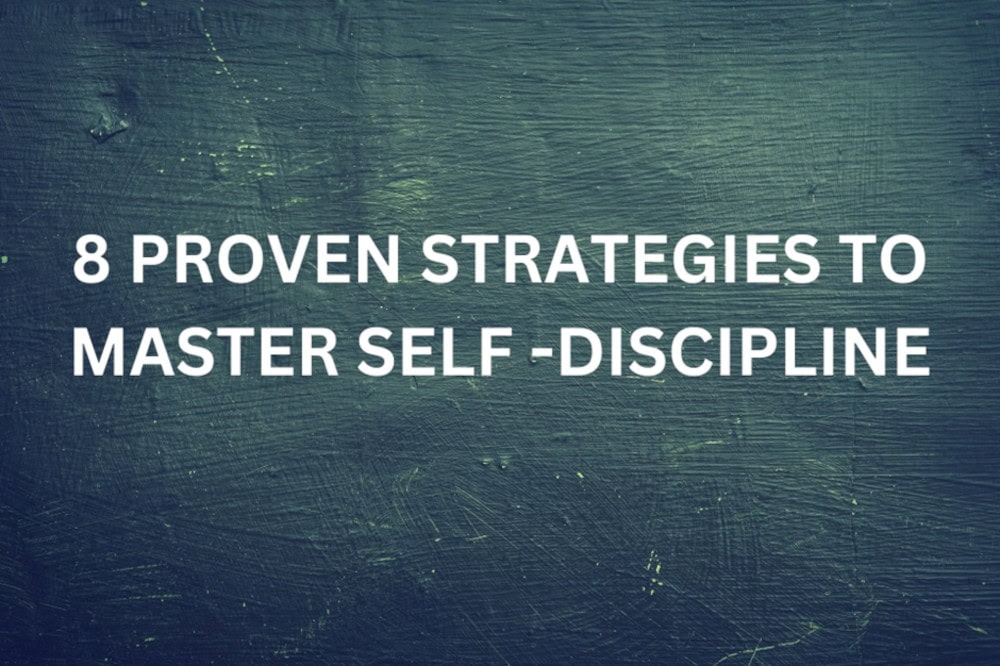In today’s fast-paced and distraction-filled world, mastering self-discipline is a game-changer for personal and professional success. Self-discipline is the key to overcoming procrastination, staying focused, and achieving your goals efficiently. But it isn’t something you’re simply born with—it’s a skill that can be developed with consistent practice and the right strategies.
Whether you want to build healthier habits, increase productivity, or stay committed to your long-term goals, learning how to improve self-discipline will transform your life. In this comprehensive guide, we’ll dive deep into eight powerful self-discipline strategies, along with actionable tips to help you stay on track. Let’s get started!
Why Self-Discipline is the Key to Success
Many people believe that motivation is the driving force behind success. However, motivation is fleeting, while self-discipline ensures consistent progress regardless of external factors. Those who master self-discipline can resist short-term temptations in favor of long-term rewards. Studies show that individuals with high levels of self-control are more successful in their careers, relationships, and personal development. So, how can you develop and strengthen self-discipline?
Here are eight proven strategies to help you master self-discipline and maximize productivity.

1. Define Your “Why” – The First Step to Strong Self-Discipline
(Self-Discipline Strategies | Motivation and Goal Setting | Personal Growth Habits | Mental Strength Development)
The cornerstone of building unshakable self-discipline lies in having a compelling reason—your “why.” When your goals are aligned with a deep, personal purpose, discipline transforms from a chore into a commitment. Your “why” becomes the emotional fuel that powers your consistency, focus, and inner drive—even when motivation fades.
How to Define Your “Why”:

✅ Clarify Your Goals: Connect to a Purpose That Matters
(Goal Setting Motivation | How to Stay Disciplined | Personal Goal Clarity)
Begin by asking yourself: “Why do I want to achieve this?” Tie your goal to something emotionally meaningful.
- If your goal is to wake up early, link it to a purpose like building a powerful morning routine, dedicating time to personal development, or gaining quiet time for reflection.
- Make your goals specific, emotionally charged, and future-focused.
- Align your goals with long-term vision and core values for deeper commitment.
✅ Write Down Your ‘Why’: Reinforce Your Commitment Daily
(Goal Tracking Tools | Commitment Habits | Motivation Tips for Discipline)
Documenting your goals—and the reason behind them—turns intentions into tangible reminders. This is a powerful habit used by highly disciplined individuals.
- Keep your “why” in a place you’ll see often: your journal, digital wallpaper, or a sticky note on your mirror.
- Use daily affirmations based on your “why” to prime your mind each morning.
- Revisit and revise your “why” as you evolve—it should grow with you.
✅ Use Visualization Techniques: Program Your Mind for Success
(Visualization for Success | Mental Imagery for Goals | How to Strengthen Self-Discipline)
Visualization is a proven tool in neuroscience and performance psychology. When you mentally rehearse success, your brain treats it as real—making the path to discipline smoother and more instinctive.
- Spend 2–5 minutes daily visualizing yourself taking action and reaping the rewards of your self-discipline.
- Imagine how it feels to follow through on your habits: the pride, the momentum, the results.
- Visualization strengthens your emotional attachment to the process, not just the outcome.
2. Build Small, Consistent Habits for Long-Term Success
(Habit Formation Strategies | Daily Discipline Routines | Long-Term Success Habits | Consistency and Motivation Tips)
One of the biggest misconceptions about self-discipline is the idea that it requires monumental willpower or life-altering changes. In reality, lasting self-discipline is built through the compounding effect of small, consistent habits. Just like compound interest grows over time, so does your discipline when you commit to tiny positive actions every day.
How to Develop Good Habits:

✅ Start Small: Create Manageable Micro-Habits
(Mini Habits for Success | Easy Habits to Start | Self-Discipline for Beginners)
Don’t try to overhaul your life overnight. The key is to lower the barrier to entry so you can show up consistently.
- Instead of saying “I’ll meditate for 30 minutes,” start with 2 minutes of deep breathing.
- Want to read more? Begin with 5 pages a day—or even just one.
- Tiny wins build confidence and signal progress, which reinforces the habit loop.
✅ Use Habit Stacking: Leverage Existing Routines
(Habit Stacking Technique | Habit Building System | Productivity Hacks)
A powerful method from James Clear’s Atomic Habits, habit stacking is about pairing a new habit with something you already do regularly.
- Example: After brushing your teeth, do 10 push-ups.
- After making your morning coffee, write in your gratitude journal.
- Habit stacking creates mental triggers that make discipline almost automatic.
✅ Follow the 2-Minute Rule: Make It So Easy You Can’t Fail
(Tiny Habits Method | Quick Motivation Techniques | Overcome Procrastination Tips)
The 2-minute rule says: If it takes less than 2 minutes to do, just do it. The idea is to make the new habit so simple, it removes resistance.
- Want to journal? Just write one sentence.
- Want to stretch? Touch your toes for 30 seconds.
- This strategy creates momentum. Once you start, you’re likely to continue longer.
✅ Track Your Habits: Stay Accountable and Celebrate Progress
(Habit Tracker Tools | Motivation for Daily Habits | Accountability Techniques)
What gets measured, gets managed. A habit tracker helps you visually track consistency and gives you a dopamine boost every time you check off a task.
- Use a physical calendar or digital apps like Habitica, Streaks, or Notion.
- Share your goals with a friend or accountability partner.
- Celebrate small wins—progress, not perfection, builds momentum.
✅ Focus on Systems, Not Just Goals
(Building Systems for Success | Long-Term Behavior Change | James Clear Habits Quotes)
As James Clear says in Atomic Habits:
“You do not rise to the level of your goals; you fall to the level of your systems.”
- Don’t rely solely on motivation—design your environment to make habits easy.
- Systems = routines, cues, tools, and rewards that keep your actions aligned.
- Make good behavior the default choice—structure beats willpower every time.
3. Prioritize High-Impact Tasks to Boost Productivity
(Task Prioritization Techniques | Time Management for Success | Productivity Hacks | Self-Discipline and Focus)
True self-discipline isn’t just about willpower—it’s about making smarter decisions with your time and energy. One of the most powerful ways to enhance your productivity is by focusing on high-impact tasks that drive results. When you learn to prioritize effectively, you accomplish more with less stress and cultivate a disciplined mindset that fuels long-term success.
How to Prioritize Tasks Effectively:
✅ Use the Eisenhower Matrix: Eliminate the Noise and Focus on What Matters
(Eisenhower Matrix Productivity | Urgent vs Important | Time Management Tools)
The Eisenhower Matrix is a simple yet powerful framework for prioritizing tasks by urgency and importance:
- Quadrant 1: Urgent and Important → Do it now (e.g., deadlines, crises).
- Quadrant 2: Important but Not Urgent → Schedule it (e.g., planning, self-growth).
- Quadrant 3: Urgent but Not Important → Delegate it (e.g., some emails or calls).
- Quadrant 4: Neither → Eliminate or reduce (e.g., excessive social media scrolling).
💡 Focus most of your time in Quadrant 2, where proactive growth and leadership happen.
✅ Apply the “Eat That Frog” Technique: Tackle Your Toughest Task First
(Brian Tracy Productivity Method | Morning Routine for Success | Self-Discipline in Work)
Coined by Brian Tracy, this technique is based on the idea that if the hardest thing you had to do today was eat a frog—do it first. Why?
- Your willpower is highest in the morning.
- Completing the most difficult task early builds momentum and confidence.
- It eliminates procrastination and increases daily satisfaction.
🎯 Choose your most important or most dreaded task and complete it first thing.
✅ Break Down Large Projects into Smaller, Actionable Steps
(Overcoming Overwhelm | Project Management Tips | Small Steps Strategy)
Big goals can feel overwhelming. But by chunking them into bite-sized, manageable tasks, you reduce anxiety and build clarity.
- Use tools like Trello, Notion, or a simple to-do list to map out smaller tasks.
- Focus on one micro-task at a time, and celebrate progress with each step.
- This approach helps you stay consistent, avoid burnout, and keep moving forward.
✅ Focus on High-Leverage Activities that Create Maximum Results
(80/20 Rule | Pareto Principle | Work Smarter Not Harder)
Use the Pareto Principle (80/20 Rule): 80% of your results often come from 20% of your efforts.
- Identify which tasks drive the most impact—whether in your business, fitness, finances, or personal development.
- Reduce time spent on low-value activities and reallocate it to what truly moves the needle.
By prioritizing the right tasks, you gain more control over your time, eliminate distractions, and make powerful strides toward your goals. Self-discipline and productivity go hand in hand—and this approach sets the foundation for both.
4. Eliminate Distractions & Improve Focus
(How to Improve Focus | Eliminate Distractions | Time Management Techniques | Self-Discipline Tips | Deep Work Strategies)

One of the biggest enemies of self-discipline is constant distraction. Whether it’s the buzz of a smartphone notification, the lure of social media, or interruptions in your workspace, distractions hijack your focus and drain your productivity. Mastering the ability to concentrate deeply is a cornerstone of building unshakeable discipline and achieving meaningful goals.
Steps to Minimize Distractions:
✅ Create a Dedicated Workspace: Design an Environment That Supports Discipline
(Productive Workspace Setup | Work-from-Home Focus Tips | Organized Workstation Ideas)
Your environment shapes your behavior. A cluttered, noisy, or chaotic space can lead to mental fog and frequent distractions.
- Set up a clean, organized, and dedicated area for focused work or study.
- Use noise-canceling headphones or ambient sound apps to minimize background noise.
- Keep only essential items on your desk to reduce visual distractions.
🧠 “Your outer environment mirrors your inner discipline.”
✅ Turn Off Notifications: Reclaim Your Attention Span
(Digital Minimalism | Phone Distraction Management | App Blockers for Focus)
Smartphones are a double-edged sword—they connect us, but they also fragment our focus.
- Use tools like Do Not Disturb, Focus Mode, or apps like Freedom, Forest, or Cold Turkey to block distracting apps and websites during work hours.
- Check messages and emails at set intervals, not constantly.
- Consider putting your phone in another room while working on high-focus tasks.
✅ Use the Pomodoro Technique: Train Your Brain for Sustained Focus
(Pomodoro Technique Benefits | Productivity Time Blocks | Focus Management Techniques)
The Pomodoro Technique is a simple but powerful time management method that helps you stay sharp and motivated.
- Work in 25-minute focused intervals followed by 5-minute breaks.
- After four “Pomodoros,” take a longer 15–30 minute break.
- This structure prevents burnout and keeps your mind fresh while boosting focus.
🎯 Use timers or Pomodoro apps like Focus Keeper or Toggl Track to stay on schedule.
✅ Set Boundaries: Protect Your Time and Attention
(Time Blocking Strategies | Distraction-Free Workday | Focus Boundaries at Work)
Lack of boundaries leads to reactive behavior and scattered energy. Take control by setting clear rules:
- Designate tech-free zones or times during the day (e.g., no phone during deep work).
- Communicate your working hours to family or coworkers to minimize interruptions.
- Batch-check emails instead of constantly monitoring your inbox.
⏰ Your time is your most valuable asset—protect it like a CEO.
5. Use a Distraction Pad to Stay on Track: Train Your Brain for Laser Focus
(How to Stay Focused | Distraction Management Tools | Productivity Hacks | Improve Concentration | Self-Discipline Techniques)
Your mind is a constant stream of thoughts. From remembering to reply to an email, to wondering what’s for dinner—mental interruptions can derail even your best focus. That’s where the simple yet powerful Distraction Pad comes in. It’s one of the most effective productivity tools to improve self-discipline and maintain deep focus.

How to use a Distraction Pad to master your attention:
✅ Keep a Physical or Digital Pad Nearby: Externalize Mental Noise
(Focus Tools for Productivity | How to Stay Focused While Working | Reduce Mental Clutter)
Whether it’s a notebook, sticky note, or a Google Doc—your distraction pad is your mental inbox.
- Keep it within arm’s reach whenever you’re doing deep work or studying.
- Choose a format that feels easy and accessible—digital for tech-lovers, physical for analog thinkers.
- Use voice memos or apps like Evernote or Notion if you’re working on the go.
🧠 “The brain is for having ideas, not holding them.” — David Allen
✅ Write Down Distracting Thoughts as They Arise: Pause, Note, Refocus
(Mindfulness Techniques | Improve Concentration at Work | Mental Focus Exercises)
Our brains are designed to seek novelty. But every time you chase a random thought, you lose momentum.
- The moment you have a non-urgent thought—write it down.
- This could be “buy groceries,” “reply to Mark,” or “check news.”
- Then immediately return to your primary task without judgment.
💡 This habit trains your mind to defer distractions instead of indulging them.
✅ Review the List Later: Deal with Distractions on Your Terms
(Time Management Tips | Mental Clarity Techniques | Focus Review Habits)
A distraction pad isn’t a to-do list—it’s a parking lot for your mind.
- Review your notes after your deep work session is complete.
- Decide whether the thoughts require action, delegation, or deletion.
- Over time, you’ll realize most distractions aren’t urgent, and your brain will learn not to react impulsively.
✅ Strengthen Your Focus Muscle Over Time: Discipline Through Awareness
(Build Self-Discipline | Cognitive Focus Training | Deep Work Habits)
Each time you redirect your attention from a distraction back to the task at hand, you’re building mental strength.
- Like a muscle, focus improves with consistent training.
- The Distraction Pad is a low-effort, high-impact method to enhance your executive functioning and willpower.
By using a Distraction Pad, you’re not only preventing mental detours—you’re teaching your brain to stay present, intentional, and aligned with your goals. It’s a small change that yields massive long-term results in productivity, clarity, and self-discipline.
6. Embrace Discomfort – Growth Comes from Challenge
(Mental Toughness | Growth Mindset | How to Build Self-Discipline | Step Outside Comfort Zone | Overcoming Procrastination)
If you’re waiting for the “right mood” to take action, you’ll be waiting forever. Self-discipline thrives not in comfort, but in challenge. The willingness to lean into discomfort is what separates high-achievers from the average. It’s where true mental strength, personal growth, and lasting transformation begin.
How to Overcome Discomfort and unlock your full potential:
✅ Accept That Discomfort is Temporary: Get Comfortable Being Uncomfortable
(Develop Mental Toughness | How to Build Grit | Increase Pain Tolerance for Success)
Your brain is wired to seek pleasure and avoid pain. But discomfort isn’t danger—it’s growth in disguise.
- Understand that discomfort is transient—it comes and goes like a wave.
- Every moment you push through it, you’re training your mental resilience.
- Whether it’s a tough workout, an awkward conversation, or a new challenge—lean in.
✅ Reframe Difficulty as Opportunity: Shift Your Mindset Toward Growth
(Growth Mindset Strategies | Reframing Techniques | Success Through Struggle)
What you label as “hard” is often just unfamiliar. Reframing transforms obstacles into opportunities for mastery.
- Instead of saying “This is hard,” say “This is helping me grow.”
- Difficult situations force you to adapt, learn, and evolve.
- Adopt a mindset that celebrates effort, not just results.
💡 “Every challenge you face is a test of your commitment to your goals.”
✅ Practice Delayed Gratification: Train Your Brain to Wait for Rewards
(Self-Control Techniques | Delay Gratification Psychology | Productivity Habits)
One of the strongest predictors of success is the ability to delay gratification—choosing long-term gain over short-term pleasure.
- Set micro-rewards: Allow yourself a treat only after completing a meaningful task.
- Resist distractions like social media until work is done.
- Over time, you’ll rewire your brain to associate effort with reward, not avoidance.
✅ Train with Discomfort: Cold Showers, Hard Workouts & More
(Resilience Training | Daily Mental Toughness Routines | How to Become More Disciplined)
Intentional discomfort builds mental endurance. By exposing yourself to controlled stress, you build your capacity for bigger challenges.
- Try cold showers to develop shock resilience and mental grit.
- Engage in intense workouts that push your physical and mental limits.
- Volunteer for tasks that feel “uncomfortable” to train your discipline muscle.
💪 Discomfort becomes easier the more you consciously practice it.
✅ BonusTip: Celebrate the Win After the Struggle
Don’t skip this part—celebrate your courage every time you choose growth over comfort. These moments compound into a life of self-mastery and strength.
7. Set Yourself Up for Success with Smart Planning
(Productivity Tips | Self-Discipline Strategies | Time Management | How to Stay Focused | Planning for Success)
Success isn’t accidental—it’s the result of intentional planning and smart structure. One of the most effective ways to strengthen self-discipline is by designing your environment and routine to support your goals. When you eliminate obstacles and reduce daily friction, following through becomes second nature.
How to set yourself up for Success:
✅ Prepare in Advance: Eliminate Excuses Before They Arise
(Morning Routine Hacks | Success Habits | Productivity for High Performers)
Simple preparation can drastically increase the likelihood that you’ll stick to your intentions.
- Lay out your workout clothes the night before to encourage morning exercise.
- Pre-pack meals or healthy snacks to avoid impulsive eating.
- Organize your workspace so you’re ready to dive into deep work immediately.
🔁 Preparation reduces resistance and increases your likelihood of consistent action.
✅ Use the 5-Second Rule: Beat Procrastination with Immediate Action
(Beat Procrastination Fast | Productivity Hacks)
The moment you hesitate, your brain looks for ways to talk you out of action. The 5-second rule helps interrupt that pattern.
- Count backward: “5-4-3-2-1—Go.”
- Take action before your mind creates resistance.
- This simple trick bypasses hesitation and builds momentum.
It’s a powerful brain hack for instant motivation and improved self-discipline.
✅ Plan Your Day: Structure Creates Freedom
(Time Management Skills | Daily Planning Tips | Productivity Systems for Entrepreneurs)
Without a plan, your day will get hijacked by distractions. Time-blocking and task-scheduling help you stay focused and intentional.
- Start your day by identifying 2–3 key priorities.
- Use planners or digital tools like Notion, Todoist, or Google Calendar.
- Set time limits for tasks and schedule breaks to avoid burnout.
⏳A structured schedule improves focus and makes progress predictable and trackable.
✅ Reduce Decision Fatigue: Save Your Willpower for What Matters
(Decision Fatigue Solutions | Mental Clarity Tips | How to Simplify Your Routine)
Every decision you make drains a bit of your willpower. The fewer choices you need to make daily, the easier it is to stay disciplined.
- Meal prep for the week so you’re not debating dinner every night.
- Stick to a simple wardrobe or outfit rotation to streamline mornings.
- Automate bills, supplements, or recurring purchases.
Less mental clutter = more energy for meaningful tasks.
✅ Bonus Tip: Design an Environment That Supports Your Goals
Your environment is either working for you or against you.
- Keep distractions (like your phone) out of sight during deep work.
- Surround yourself with visual reminders of your goals.
- Spend time with people who embody the discipline and habits you want to build.
🏡 Your environment is the silent partner in your success.
8. Track Your Progress & Celebrate Small Wins
(Self-Discipline Techniques | Motivation Tips | Productivity Tracking | Habit Building Tools | How to Stay Motivated)

Building self-discipline isn’t just about effort—it’s about recognizing progress. When you track your actions and celebrate small victories, you create a feedback loop that reinforces positive habits and boosts long-term motivation. Each win, no matter how small, becomes fuel for the next step forward.
How to effectively track progress and celebrate your wins to strengthen self-disciplineTrack Progress:
✅ Keep a Habit Tracker: Visualize Your Consistency
(Best Habit Tracking Apps | Daily Routine Tracker | Accountability Tools)
Tracking habits makes your efforts tangible and helps you stay accountable.
- Use apps like Habitica, Streaks, Notion, or TickTick.
- Or go analog: use a bullet journal, printable habit tracker, or wall calendar.
- Watch your progress build through streaks and completion graphs—it’s incredibly satisfying and motivating.
📈 Seeing your progress visually keeps you consistent and gives you a sense of accomplishment every day.
✅ Journal Your Achievements: Capture the Wins
(Mindset for Success | Gratitude & Goal Journaling | How to Stay Motivated)
Writing down your daily wins shifts your focus toward what’s working and helps build momentum.
- Reflect on your progress every evening, even if it’s small (e.g., “I woke up on time” or “Completed my workout”).
- Use a success journal or gratitude log to stay emotionally connected to your growth.
- Over time, your journal becomes a record of your transformation—something to revisit during challenging days.
📝 Journaling reinforces positive identity, which is key to developing long-term discipline.
✅ Reward Yourself: Reinforce the Right Habits
(Positive Reinforcement Strategies | Habit Formation Psychology | Reward-Based Motivation)
Celebrating milestones—big or small—helps anchor your behaviors and makes the journey enjoyable.
- Choose healthy, meaningful rewards (e.g., a coffee treat, a relaxing break, a walk, or a movie night).
- Set specific milestones tied to rewards (e.g., “If I meditate for 30 days straight, I’ll buy that new book”).
- Avoid counterproductive rewards that undo your progress (e.g., junk food after a fitness goal).
🎉 Celebration keeps your inner motivation alive and makes self-discipline sustainable.
✅ Bonus Tip: Reflect Weekly to Refine and Recalibrate
(Weekly Review System | Goal Tracking for Success | Reflective Productivity Practices)
Tracking is most effective when combined with weekly reflection:
- Ask: What went well? What didn’t? What needs adjustment?
- Revisit your goals and reset intentions for the upcoming week.
- Celebrate your consistency and use setbacks as learning opportunities.
📊 This habit turns self-discipline into a self-correcting system that adapts and improves over time.
Conclusion
Mastering self-discipline isn’t about achieving perfection—it’s about making consistent, incremental progress. By implementing these eight proven strategies, you can develop unbreakable self-discipline, maximize productivity, and create lasting success in both personal and professional life.
If you want personalized strategies to boost your discipline and achieve your goals, explore our Life Coaching services.
For more personalized guidance, book a consultation today and start mastering self-discipline for long-term success!
You may also like: Master Your Mindset: How to Reprogram Your Thoughts for Success








0 Comments